

Dec . 15, 2024 08:54 Back to list
Understanding the Costs Associated with Industrial Shredders
In the manufacturing and recycling sectors, industrial shredders play a crucial role in waste management and processing. These machines are designed to reduce large volumes of material into smaller, more manageable pieces, facilitating easier handling and recycling. However, when considering the acquisition of an industrial shredder, understanding the associated costs is essential for businesses looking to optimize their operations. This article explores the various factors influencing the cost of industrial shredders and provides insights for potential buyers.
Initial Purchase Costs
The first and most obvious expense is the initial purchase price of the industrial shredder. Prices can range significantly based on several factors, including the machine's size, capabilities, brand, and features. For example, a small, single-shaft shredder may cost anywhere from $10,000 to $50,000, while larger, more sophisticated models with multi-shaft configurations and specialized features can range from $50,000 to $500,000 or more. Companies must carefully assess their shredding requirements and choose a machine that balances cost with functionality.
Operational Costs
Beyond the purchase price, operational costs are another critical component to consider. These expenses include electricity consumption, maintenance, and repair costs. Industrial shredders typically require a substantial amount of energy to operate, which can lead to high utility bills depending on usage levels and local energy rates. Additionally, regular maintenance is essential to ensure that the shredder operates efficiently and has a long lifespan. Maintenance costs can vary but should be budgeted as part of the total cost of ownership.
Replacement Parts and Downtime

Another often-overlooked cost is the potential need for replacement parts and the impact of downtime. Over time, wear and tear on components like blades and motors can lead to the necessity of replacements. High-quality parts may come at a premium, but investing in durable components can ultimately save money in the long run by reducing the frequency of replacements. Moreover, downtime during repairs can result in lost productivity and revenue, making it essential to factor this risk into overall cost considerations.
Specific Applications and Specialization
Different industries may require specialized shredders tailored to their specific needs. For instance, the requirements for shredding metals will differ significantly from those for plastics or organic waste. This specialization can dramatically affect costs since machines built for specific applications typically incorporate advanced technology and features designed for efficiency and productivity. Buyers must be aware that while standard models may come at lower prices, specialized machinery could lead to better throughput and long-term savings.
Resale Value
Finally, it is worth considering the resale value of an industrial shredder. As technology evolves, older models can depreciate quickly. However, well-maintained shredders from reputable manufacturers may retain their value better, providing a potential return on investment when the time comes to upgrade. Businesses should consider the potential depreciation and resale market when budgeting their total costs.
Conclusion
In conclusion, the cost of an industrial shredder encompasses much more than just the initial purchase price. Companies must also account for operational expenses, maintenance, the potential impact of downtime, specific application requirements, and the machine's resale value. By carefully evaluating these factors, businesses can make informed decisions that align with their operational goals and budgetary constraints. Investing in a quality industrial shredder can enhance waste management processes, improve efficiency, and ultimately contribute to a more sustainable approach to material handling and recycling. As industries continue to evolve, the role of shredders in improving operations and reducing waste will only become more critical.
Latest news
Troubleshooting Common Eddy Separator Problems
NewsJul.04,2025
The Role of Metal Recycling Plants in Circular Economy
NewsJul.04,2025
The Impact of Recycling Line Pickers on Waste Management Costs
NewsJul.04,2025
Safety Features Every Metal Shredder Should Have
NewsJul.04,2025
How Industrial Shredders Improve Waste Management Systems
NewsJul.04,2025
How Cable Granulators Contribute to Sustainable Recycling
NewsJul.04,2025